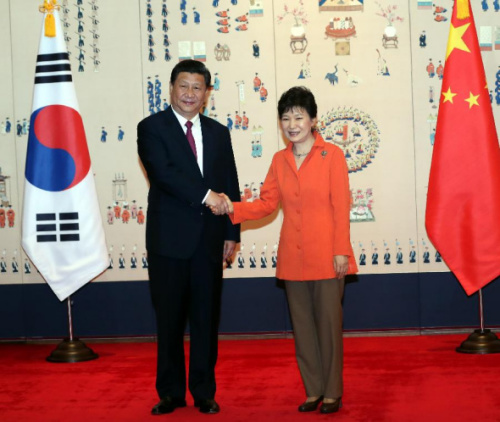
Chinese President Xi Jinping (L) shakes hands with South Korean President Park Geun-hye in Seoul, South Korea, July 3, 2014. (Xinhua/Lan Hongguang)
China and South Korea on Monday formally signed the bilateral free trade agreement (FTA), sharing views that the free trade pact will serve as an all-round cooperative platform for both countries to seek new growth engines.
Chinese Commerce Minister Gao Hucheng and his South Korean counterpart Yoon Sang-jick formally signed the bilateral FTA in central Seoul, three years after the two countries began talks on the deal in May 2012.
After Chinese President Xi Jinping's state visit to Seoul in July 2014, negotiations on the pact witnessed rapid progress. President Xi and his South Korean counterpart Park Geun-hye announced a conclusion of substantive negotiations on the deal in Beijing in November 2014, and the two nations initialed the FTA three months later.
The deal, written in Chinese, Korean and English, will be implemented after getting approval from parliaments of both countries.
Xi and Park exchanged letters to re-confirm their support and expectations for the largest bilateral FTA for China in terms of trade volume.
Xi said in his letter that the FTA will bring a leap forward in the bilateral trade relationship, substantively benefit the people of both countries and further contribute to economic integration of East Asia and the Asia-Pacific region, as well as to the global economic development.
Park said in her letter that the FTA deal is a historic landmark which will deepen the bilateral strategic cooperative partnership and serve as an institutional framework for future cooperation.
During the ministerial talks on the sidelines of the formal signing ceremony, Gao and Yoon shared views that the Sino-South Korea FTA will expand bilateral trade and investment, and that it will serve as an all-round cooperative platform for the two countries to seek new growth engines.
The two commerce ministers exchanged views on various issues, including a regional economic integration via the trilateral FTA between Beijing, Seoul and Tokyo and the Regional Comprehensive Economic Partnership (RCEP).
Under the China-South Korea free trade deal, South Korea will eliminate tariffs on 92 percent of all products from China within 20 years after the implementation, in return for China abolishing tariffs on 91 percent of all South Korean goods.
The two countries agreed to resume negotiations about the services sector within two years after the FTA comes into force to seek an opportunity for further liberalization of the sector.
Also, a total of 310 products manufactured in the Kaesong Industrial Complex would be subject to preferential tariffs right after the FTA implementation, allowing for more benefits to the inter-Korean industrial park than any other free trade pacts that South Korea has signed.
The industrial zone is located in the DPRK's border town of Kaesong, north of the heavily fortified inter-Korean land border. About 120 South Korean companies are running factories there, hiring some 53,000 DPRK workers.
South Korea expected the bilateral FTA to raise its real GDP by 0.96 percentage points and create 53,800 new jobs in the next 10 years after the implementation. The FTA was forecast to help South Korean companies make foray into the world's largest consumer market.
China's gross domestic product (GDP) amounted 10.4 trillion U.S. dollars in 2014, more than 7 times of South Korea's 1.4 trillion U. S. dollars, according to Seoul's trade ministry. It said that the Chinese economy is one of the world's fastest growing economies with an annual growth rate of more than 7 percent.
Trade between China and South Korea has kept rising to 235.4 billion U.S. dollars in 2014 from 6.4 billion dollars in 1992 when the two countries established diplomatic ties, according to data from the Korea International Trade Association (KITA).
China has been South Korea's No.1 trading partner since 2004. South Korea has been China's fourth-largest trade partner since the same year, according to the KITA data.
















































